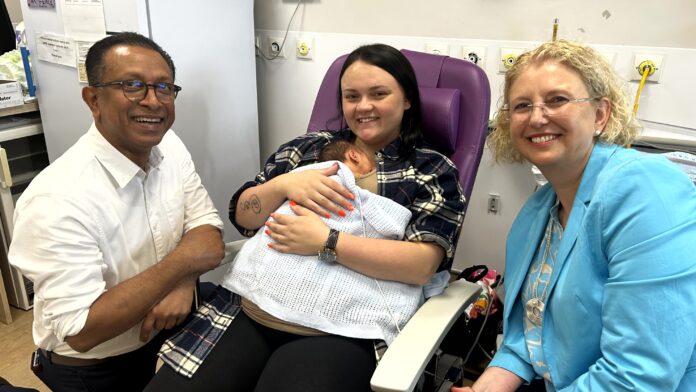
A MILESTONE in the provision of critical care of tiny, premature, and seriously ill newborns has been reached at University Maternity Hospital Limerick (UMHL) with the refurbishment of the hospital’s Neonatal Intensive Care Unit (NICU).
The littlest and most vulnerable babies and their families, as well a staff at the hospital, are experiencing transformed environment in the two-storey extension and refurbished clinical space.
Completed in two phases over the past five years with no interruption to NICU care, the project, representing a €9.7m HSE investment, has attracted international attention.
Ms Silke Mader, founder and chair of the Global Foundation for the Care of Newborn Infants (GFCNI), from Germany, visited the unit soon after the new facility was operational.
Many non-clinical spaces in the original neonatal unit, including parents’ accommodation, a lactation centre, a clinical engineering unit, and support facilities for staff and admin teams, are now housed in the two-storey extension.
This has freed the space for a dramatic refurbishment and expansion of cot space in the intensive care, high dependency, and purpose-built isolation areas.
The new unit avoids crowding, enhances opportunities for skin-to-skin contact between preterm infants and parents, improves the breastfeeding rates of high-risk neonates, reduces the risk of infection outbreaks, and creates in-built provision for surge capacity, the HSE has said.
There area also holds new mother-and-baby rooms for family-centred care.
Managed by HSE Capital and Estates and developed by DK Architects, John Halligan Architects, and O’Brien Building and Civil Contractors, the project has been executed to an evidence-based “blended design” concept, informed by UMHL and parental input via interactions with the Irish Neonatal Health Alliance and the GFCNI.
The project’s clinical lead, consultant neonatologist Prof Roy K Philip, said: “We are thrilled to see the benefits offered by this project to the families of critically ill and premature newborn infants of the Mid West. We envisage that an evidence-based design and infrastructure, developed through our collective multidisciplinary effort and HSE’s support, will complement the quality of neonatal care for years to come.”


